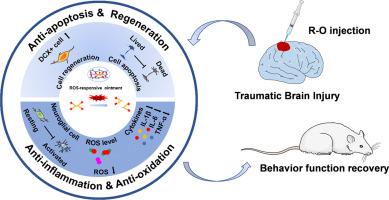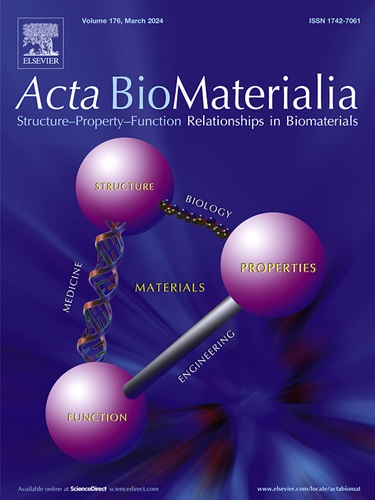通过注射含硒软膏有效治疗脑外伤。
IF 9.4
1区 医学
Q1 ENGINEERING, BIOMEDICAL
引用次数: 0
摘要
创伤性脑损伤(TBI)是一种无法治愈的严重疾病,伴随着残疾和巨大的经济负担,过量产生的活性氧(ROS)会加重继发性损伤,导致神经元大量凋亡。在这项研究中,β-环糊精(CD)封端的含硒超支化聚合物(HSE-CD)与 CD 改性透明质酸(HA-CD)和金刚烷胺改性透明质酸(HA-AD)交联,得到了一种 ROS 响应软膏(R-O)。用 1H 核磁共振对合成聚合物的结构进行了表征,并用流变学和抗氧化性对软膏的性能进行了研究。与非 ROS 响应软膏(N-O)相比,R-O 软膏在体外降低 BV2 细胞中的 ROS 水平方面具有更强的功效。在受控大鼠大脑皮层撞击(CCI)模型中,R-O软膏可通过降低ROS水平缓解DNA损伤并减少损伤区域的细胞凋亡。此外,大鼠在接受 R-O 治疗后,活化的星形胶质细胞和小胶质细胞明显减少,促炎细胞因子水平降低,M2/M1 巨噬细胞和小胶质细胞的比例升高。此外,与创伤性脑损伤组相比,R-O 软膏促进了脑腔周围双皮质素(DCX)的表达和组织结构的完整性,并促进了创伤性脑损伤后神经功能的恢复。意义说明:创伤性脑损伤(TBI)是一种无法治愈且难以承受的疾病,会导致严重的残疾和巨大的社会负担,而活性氧(ROS)被认为是造成 TBI 继发性损伤的最重要因素之一。一种含有二硒化物键的 ROS 反应超分子软膏被注射到受控皮质冲击的大鼠体内。它通过降低 ROS 水平缓解了损伤区域的 DNA 损伤并减少了细胞凋亡,降低了神经炎症,改善了体内创伤性脑损伤的神经功能恢复。这种设计的自适应生物材料有效调节了损伤组织的病理微环境,取得了更好的治疗效果。本文章由计算机程序翻译,如有差异,请以英文原文为准。

Effective treatment of traumatic brain injury by injection of a selenium-containing ointment
Traumatic brain injury (TBI) is an incurable and overwhelming disease accompanied with serve disability and huge financial burden, where the overproduced reactive oxygen species (ROS) can exacerbate the secondary injury, leading to massive apoptosis of neurons. In this study, β-cyclodextrin (CD)-capped hyperbranched polymers containing selenium element (HSE-CD) were crosslinked with CD-modified hyaluronic acid (HA-CD) and amantadine-modified hyaluronic acid (HA-AD) to obtain a ROS-responsive ointment (R-O). The structures of synthesized polymers were characterized with 1H nuclear magnetic resonance, and the properties of ointment were investigated with rheology and antioxidation. Compared to non-ROS-responsive ointment (N-O), the R-O ointment had stronger efficiency in decreasing the ROS level in BV2 cells in vitro. In a controlled rat cortical impact (CCI) model, the R-O ointment could relieve the DNA damage and decrease apoptosis in injured area via reducing the ROS level. Besides, after the R-O treatment, the rats showed significantly less activated astrocytes and microglia, a lower level of pro-inflammatory cytokines and a higher ratio of M2/M1 macrophage and microglia. Moreover, compared to the TBI group the R-O ointment promoted the doublecortin (DCX) expression and tissue structure integrity around the cavity, and promoted the recovery of nerve function post TBI.
Statement of significance
Traumatic brain injury (TBI) is an incurable and overwhelming disease, leading to severe disability and huge social burden, where reactive oxygen species (ROS) are considered as one of the most significant factors in the secondary injury of TBI. A ROS responsive supramolecular ointment containing di-selenide bonds was injected in rats with controlled cortical impact. It relieved the DNA damage and decreased apoptosis in the injured area via reducing the ROS levels, downregulated neuroinflammation, and improved neurological recovery of TBI in vivo. This designed self-adaptive biomaterial effectively regulated the pathological microenvironment in injured tissue, and achieved better therapeutic effect.
求助全文
通过发布文献求助,成功后即可免费获取论文全文。
去求助
来源期刊

Acta Biomaterialia
工程技术-材料科学:生物材料
CiteScore
16.80
自引率
3.10%
发文量
776
审稿时长
30 days
期刊介绍:
Acta Biomaterialia is a monthly peer-reviewed scientific journal published by Elsevier. The journal was established in January 2005. The editor-in-chief is W.R. Wagner (University of Pittsburgh). The journal covers research in biomaterials science, including the interrelationship of biomaterial structure and function from macroscale to nanoscale. Topical coverage includes biomedical and biocompatible materials.
 求助内容:
求助内容: 应助结果提醒方式:
应助结果提醒方式:


